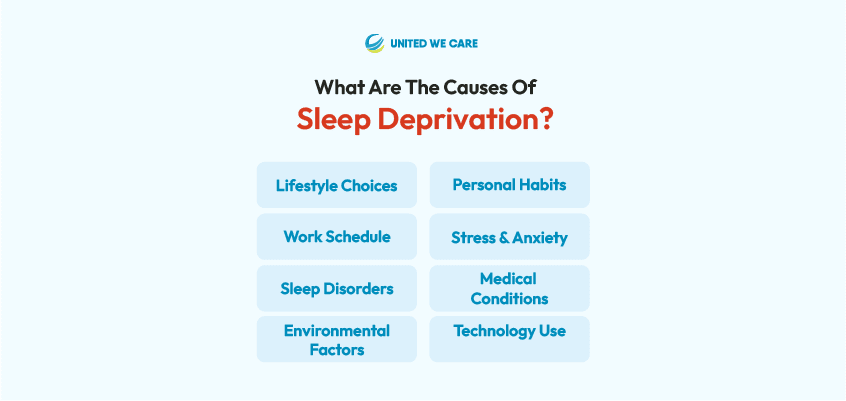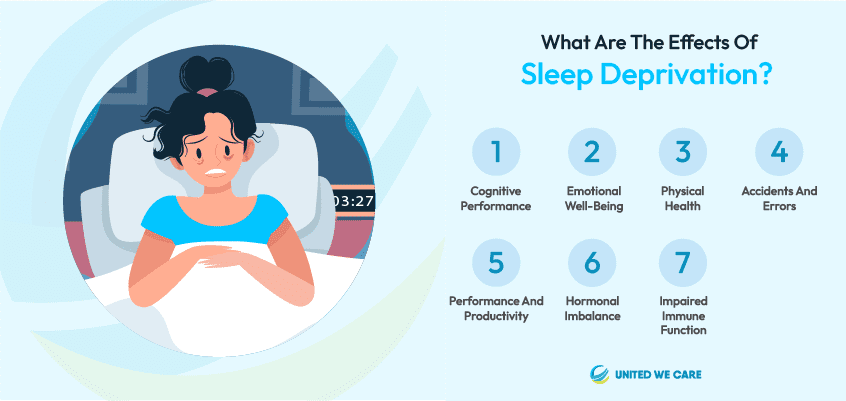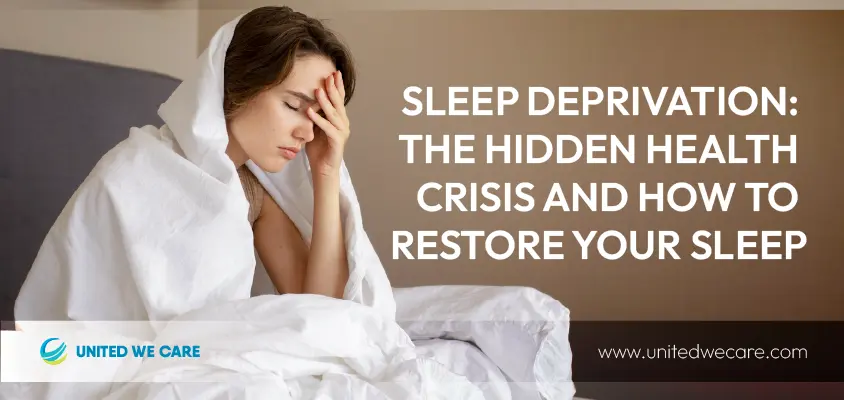Introduction
Are you getting enough sleep? How long do you take to finally go off to sleep? Do you feel rested during the day? If not, then you are probably facing ‘Sleep deprivation.’ Proper sleep is important for you to function at your highest capacity. Now, where you are unable to sleep because of someone else, you are choosing not to sleep, or you are unable to sleep, your body and your mind will get impacted. This sleep deprivation can lead to issues in your physical, mental, and emotional well-being.
“Sleep deprivation, it seems, can giveth as much as it taketh away!” -A.D. Aliwat [1]
What is Sleep Deprivation?
Sleep deprivation is when you consistently fail to get enough sleep, whether by choice or because of external factors. Some of the common external factors are work demands such as working 15 hours a day, medical conditions such as depression and cancer, or sleep disorders like insomnia.
The reason why we need sleep is that when we sleep, our body and mind recover and restore themselves and help deal with any physical, emotional, and mental concerns. When we don’t get adequate sleep, because our body and brain will not be able to recover and restore themselves fully, we can face various negative consequences. You may face sleepiness during the daytime, not being able to remember certain important details, mood swings, and physical illness like fever, infections, etc. So, you need to learn how to prioritize sleep to make sure that you are able to maintain a healthy mind and body [2].
What are The Causes of Sleep Deprivation?
While you might feel that you are just randomly not getting enough sleep, there are various underlying causes behind that [3]:

- Lifestyle Choices: I used to be proud of being a ‘night owl.’ I would prefer studying and working at night because I liked the quiet environment. These choices I made started leading to me feeling more and more tired and getting lesser sleep every day. Our body works on the solar cycle, which means that when the sun sets, we need to be less energetic so that we can sleep soundly. However, with the choices I made, I started sleeping as per the lunar cycle, which meant when the moon sets, that is when I sleep.
- Work Schedules: I have a lot of friends who work on a shift basis. Twice a week morning shift, twice a week night shift, and twice a week afternoon shift. These irregular hours and the pressures from seniors at work stop them from getting enough sleep. As a result, they are sleepy and irritated all the time.
- Sleep Disorders: Many people have sleep-related disorders as well. They include disorders like insomnia, where you cannot sleep at all; sleep apnea, where your breathing stops and starts; etc. These disorders contribute to you feeling tired from lack of sleep.
- Environmental Factors: If you are unable to get enough sleep, ask yourself if your surroundings are comfortable while you sleep. Check for noise, light, and temperature. Ideally, there should be no noise or light when you sleep. The temperature should also be cool and comfortable. Bedding also makes a huge difference, so make sure your mattress is clean and comfortable. Hecking these factors can increase your sleep quality and the number of hours you get.
- Personal Habits: Are you a coffee lover? Two cups of coffee might do you good in general, but if you’re having a cup before bedtime, then be sure to stay awake for many hours. In fact, smoking, drinking alcohol, and exercising right before bed can cause issues while falling and maintaining good sleep.
- Stress and Anxiety: Right when you hit the bed, do your thoughts go a mile an hour? These racing thoughts can be a result of stress and anxiety and can stop you from relaxing at bedtime.
- Medical Conditions: If you have any medical concerns, such as chronic pains, breathing disorders, nerves-related concerns, etc., then your sleep can get disturbed. You may face either difficulty falling asleep or difficulty staying asleep. Either way, you might feel that you haven’t gotten proper rest even if you were in bed for 7-8 hours.
- Technology Usage: The world of technology has us hooked onto it not just throughout the day but also before bed. I used to stay awake, scrolling through social media aimlessly before sleeping. What I did not realize is that phones, laptops, etc. emit a blue light that interferes with our sleep.
What are the Symptoms of Sleep Deprivation?
While I was dealing with sleep deprivation, one of the primary factors that I noticed was that I would wake up feeling tired even though I was sleeping for 7-8 hours every night. However, you can notice other symptoms of sleep deprivation [4]:
- You feel sleepy during the day.
- While driving, you are facing bouts of sleep quite often/
- You struggle to remember information.
- You struggle to concentrate for long periods.
- You take time to solve problems now.
- You get irritated and angry easily.
- You feel an increase in symptoms of stress, anxiety, or depression.
- You fall sick quite often. Fever, cold, cough, etc., have become normal for you.
- You’ve started gaining weight.
- You get hungry very quickly and crave for high-calorie dishes.
- You find it difficult to perform physical activities and stumble often.
If you are facing any of these symptoms, it’s time to look into what you can do to regulate your sleep.
What are the Effects of Sleep Deprivation?
Let’s go deeper and understand how each symptom can affect you [5]:

- Cognitive Performance: If you have been facing issues in memory and keeping the focus on something, apart from having trouble in making decisions and solving problems, then you can be sleep deprived. These issues can stop you from learning new things in life. When we stop learning, our academic and professional performance also starts going down.
- Emotional Well-Being: One of the symptoms of lack of sleep is that you get irritated and angry easily. These symptoms can lead to your emotional well-being going for a toss. You might have an issue in controlling your emotions. You might get angry or irritated at people unnecessarily. As a result, you might be more prone to develop mental health concerns like anxiety and depression.
- Physical Health: Due to lack of sleep, because of the fact you get irritated and angry quickly, you become more likely to develop illnesses like hypertension. Also, since you tend to overeat, you may develop obesity and related issues like diabetes and heart-related issues.
- Accidents and Errors: Lack of sleep can make you feel sleepy when you are sitting idle. While driving, because we don’t do anything, we are more prone to feel sleepy. This tendency can make you more prone to accidents or make errors in judgment. You might have to pay a huge price because you are sleep-deprived. Take precautions.
- Performance and Productivity: When sleep-deprived, you become less alert to details and make more mistakes. At your job, you might have to pay a heavy price since your performance and productivity can get compromised. At home, you might slack off from fulfilling your responsibilities.
- Hormonal Imbalance: If you are a female who is facing sleep deprivation, then you can end up getting hormonal illnesses like PCOD. As a male, your sperm count and quality can get compromised. Plus, an imbalance of hormones can cause increased appetite and other metabolic issues like irritable bowel syndrome.
- Impaired Immune Function: Less sleep weakens the immune system. This means that you can be more prone to infections and illness. You might get a stomach infection or fever randomly or catch a cold often.
What are the Treatment Options for Sleep Deprivation?
Let me put this across before you start feeling otherwise – Sleep deprivation is curable. There are certain measures you can take for the same [6]:
- Sleep Hygiene Practices: You can begin by implementing good sleep hygiene habits. These habits include maintaining a consistent sleep schedule and creating a comfortable sleep environment. Plus, you need to cut down on your coffee consumption and heavy exercises before bedtime. Just try to relax for 30 minutes before sleeping.
- Psychological Therapies: A psychologist can take you through certain therapeutic interventions like CBT and Hypnotherapy. These therapies can really help you deal with the underlying causes of why you are unable to fall or stay asleep. Over time, you can notice that the quality of sleep and other symptoms have reduced.
- Medical Interventions: Some sleep specialists can prescribe you certain medicines that can help you with sleep. These medicines need to be had under medical supervision and only in the recommended dosage for a short period of time. Do not consume any pills without consulting a doctor. These medicines can have adverse effects, so please be cautious. Your doctor can even recommend certain devices to help you breathe better while asleep.
- Stress Management Techniques: While I was facing issues with sleep, I used to practice techniques that helped me reduce my stress levels. I used to practice relaxation exercises and breath control. I also added practicing yoga poses for sleep and meditation before sleeping. Sometimes, I would even play some sleep music. These techniques helped me sleep easily. Over time, I started seeing great results.
Conclusion
Sleep is important for all living beings. It helps us restore and reset everything in our body and mind. However, lack of sleep can drastically impact your entire life. You can face illnesses, mood swings, and even weight gain because of sleep deprivation. This can impact your work and your relationships. Try to relax before sleeping, get into a routine, and take help where you need it.
If you face sleep deprivation, contact our expert counselors or explore more content at the United We Care app and Website! At United We Care, a team of wellness and mental health experts will guide you with the best methods for your well-being. Additionally, you can join the Sleep Wellness Program and Advanced Wellness Program for Sleep Disorders at United We Care.
References
[1] “In Limbo Quotes by A.D. Aliwat(page 5 of 24),” In Limbo Quotes by A.D. Aliwat(page 5 of 24). https://www.goodreads.com/work/quotes/88160386-in-limbo?page=5
[2] A. Bandyopadhyay and N. L. Sigua, “What Is Sleep Deprivation?,” American Journal of Respiratory and Critical Care Medicine, vol. 199, no. 6, pp. P11–P12, Mar. 2019, doi: 10.1164/rccm.1996p11.
[3 ] B. S. McEwen and I. N. Karatsoreos, “Sleep Deprivation and Circadian Disruption Stress, Allostasis, and Allostatic Load,” Sleep Medicine Clinics, vol. 17, no. 2, pp. 253–262, Jun. 2022, doi: 10.1016/j.jsmc.2022.03.005.
[4] “Sleep deprivation,” Sleep deprivation – Better Health Channel. http://www.betterhealth.vic.gov.au/health/conditionsandtreatments/sleep-deprivation
[5] E. T. Kahn-Greene, D. B. Killgore, G. H. Kamimori, T. J. Balkin, and W. D. S. Killgore, “The effects of sleep deprivation on symptoms of psychopathology in healthy adults,” Sleep Medicine, vol. 8, no. 3, pp. 215–221, Apr. 2007, doi: 10.1016/j.sleep.2006.08.007.
[6] “Insomnia – Diagnosis and treatment – Mayo Clinic,” Insomnia – Diagnosis and treatment – Mayo Clinic, Oct. 15, 2016. https://www.mayoclinic.org/diseases-conditions/insomnia/diagnosis-treatment/drc-20355173





